Finn Russell’s itinerary is looking pretty fancy, isn’t it? Paris – Cote d’Azur – Bath. With the fly-half having bid adieu to Racing 92 in the French capital, he can now look forward to being based in Nice for Scotland’s World Cup campaign, before a big-money deal takes him over the Channel to the English West Country.
If you were feeling impish, you might say it is the schedule of a playboy as much as of a playmaker. But life for Russell is not all Mediterranean sundowners and hazy Somerset ciders. Far from it. “Career-defining” is an overworked term. But the next few months could be as defining for Russell as they are for both his country and his new club.
Scotland face the stomach-churning task of navigating their way out of a pool of death, while Bath face the task of finally making a splash in the Premiership after years of leaky underperformance. Russell is going to have to steer Scotland past either South Africa or Ireland in pool B, and he will then – in short order – have to find his feet at a new club in a new country in a new league, and deliver to an expectant and loyal fanbase, who have shown remarkable patience in the face of modest returns in recent years.
It is a challenging sequence, and one that will go a decent way in determining whether Russell, 30, fully fulfils his undoubted and prodigious gifts.
“Mercurial”, “masterclass”… the hymns of praise to Russell in recent years have been numerous and full-throated. But the true test of his genius – if indeed that is what he possesses – will be laid before him in the coming months.
When Russell arrives at Bath, he will be working hand-in-glove with Lee Blackett, a new arrival to Bath’s coaching team who is known for his own audacious and enlightened approach to attacking play. It is a mouth-watering prospect, and one that could take Russell’s play to the next level.
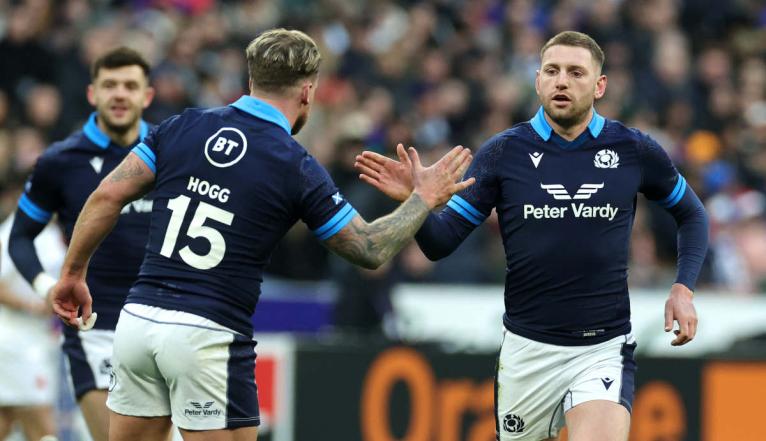
When Blackett was announced as Bath’s new assistant coach by Johann van Graan, the club’s head of rugby, the Bath boss praised Blackett’s “rugby IQ”.
But just what is rugby IQ and when does a rugby IQ attain genius status? And for our present purposes, is Finn Russell of that standing?
To understand those questions it is instructive to head back to 1971 and the British and Irish Lions tour of New Zealand. But the setting isn’t, at least to begin with, on a rugby pitch. It is a hotel lounge, where fly-half Barry John, head coach Carwyn James and the Irish prop Ray McLoughlin are discussing what makes for excellence on the rugby field, or indeed in any sport. During this conversation, McLoughlin stated the view that – assuming balance, fitness and ball-playing skills were a given – it was technical mastery and pragmatism which made the ultimate difference.
While acknowledging the importance of such factors, James, who was widely recognised as one of the game’s deepest thinkers, went further. Yes, technique and pragmatism mattered. But there was another, more intangible, more transcendental, ingredient. In his book The Great Number Tens, the journalist Frank Keating recorded James’s musings: “Instinct, intuition. Call it what you like, and a player can be nervous in the extreme at the precise moment, or ice cold and calculating, but suddenly, unpractised, an almost ‘accidental profundity’ can invade his mind in a split-atom fraction of a second and he will do something he had never thought himself capable of had he planned it for a century.”
An almost ‘accidental profundity’ can invade his mind in a split-atom fraction of a second and he will do something he had never thought himself capable of had he planned it for a century
Carwyn James
Such moments, Jones argued, came from a gift whose origins are impossible to trace. And it is a gift which can occur in many walks of life and which can elevate sport into an art form. “That’s what makes one actor, say, or one piece of journalism, or one spouting politician seem streets ahead of the other who has just as much, even more, technical and well-coached ability – spiritual, subconscious, transcendental, unknowing-where-it-came-from ruddy instinctive intuition.”
The day after their discussion, Barry John went on to deliver just one such moment of ‘accidental profundity’. Playing against a highly-rated New Zealand Universities side, John provided an other-worldly piece of off-the-cuff artistry, scoring a try that had even the most jaded, seen-it-all-before pundits purring. Dummying a drop goal, John then wrong-footed the entire defensive line with a series of ghost-footed steps, glances and effortless manoeuvrings. The try can still be found on YouTube, John coasting through the Universities defence in a dream-state glide.
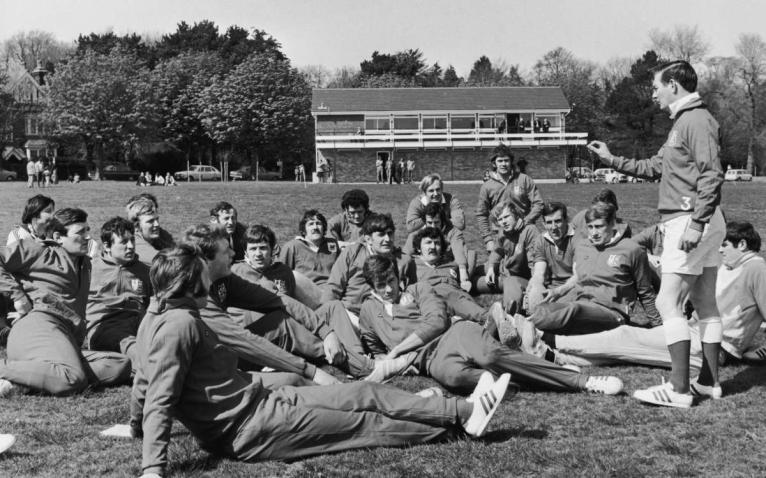
Russell is one of the very few players upon whom the phrase ‘accidental profundity’ could, on rare occasion, be bestowed. We have all seen the assists, whether for club or country: a physics-defying grubber through the legs of a congested midfield; a pass in which the ball seems more like the prop in a conjuring trick than an inflated item of sports kit. It is a species of sporting charisma.
As Carwyn James recognised, players can train for all plausible eventualities, but the greatest moments are when instinct takes over. We have seen glimpses of that instinctive brilliance from Russell, but the question lingers about whether the gift can remain harnessed, disciplined and deployed for sufficiently sustained periods of time, and in key moments.
Genius can be troubled. And as we have seen in his relationship with Scotland boss Gregor Townsend, Russell can have his troubles.
That is where Lee Blackett will come in at Bath. He is an attack-minded coach, but he is also people-minded – and is regarded as a strong nurturer of talent. These aspects of his character were very much to the fore during his successful spell as head coach at Wasps. The stats speak of his impact.
Almost overnight, Blackett worked wonders at Wasps, particularly with ball in hand. In his first year, the club set a record for the most tries scored in a Premiership regular season (71), and then proceeded to demolish that record just a year later (89).
A high rugby IQ is ultimately about making players better and hopefully making a difference in players. The second bit is about understanding the playing squad: knowing what tools you have available and what strengths the playing group has
Johann van Graan
The style with which Blackett handled the personnel and personalities in that Wasps squad is what helped Van Graan identify him as a good fit for Bath, not least with Russell on his way to the club.
But what is a strong rugby intelligence? Van Graan answers without hesitation. “A high rugby IQ is ultimately about making players better and hopefully making a difference in players. The second bit is about understanding the playing squad: knowing what tools you have available, what skillsets the players have, and what strengths the playing group has. And then it’s about forming an overall philosophy, understanding the coaching group and where we are in our journey. The other bit is that there is of course always an opposition side, and it\’s about understanding how to break them down.”
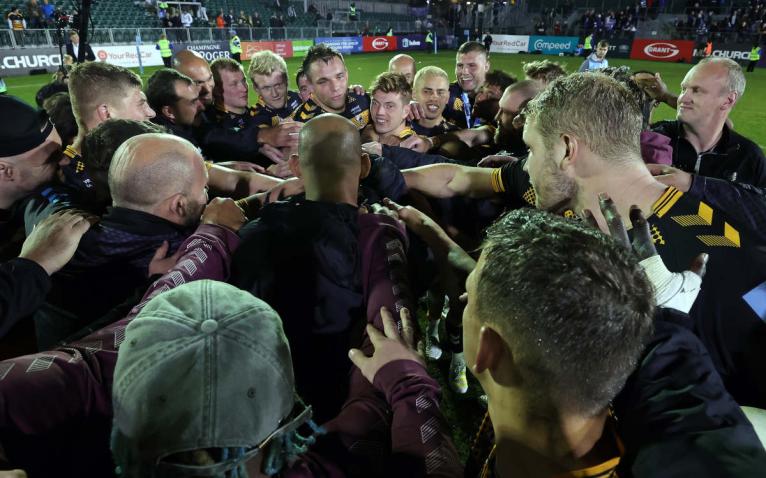
As with Blackett, the quest to unpick defences is what gets Russell out of bed in the morning. So, it is natural to wonder whether van Graan views Blackett as his means of getting the very best out of the Scot. The answer is honest and direct.
“Yes, I’d say so. Finn is a world-class player and a starting international 10. So, yes, I’d like to believe so. But it’s also about our other 10s: Orlando Bailey, Piers Francis and the young fly-halves we have coming through, and it’s also about understanding what we’ve got outside our 10s – Ollie Lawrence, Cam Redpath, Max Ojomoh… I could mention all of our backs. It’s about identifying what we have and how we’re going to use that.
“I saw something very different in Lee as a person, as a human being, and in terms of what he was part of at Wasps. And from a backs-specific point of view, if you look at Wasps over the last few years, they had some fascinating players and they did some very good things.
“But we’re not going to become this side that just runs the ball from everywhere. It’s about progressing and improving our game and I see Lee as a big part of that.”
Blackett will clearly be instrumental in masterminding Russell’s integration into Bath. If the duo gel, then the West Country side’s attack – which showed some signs of firing into life towards the end of last season – could fully ignite.
Finn for me is one of the best 10s – if not the best 10 – in the world at the moment. His skill levels are unbelievable. But look at Racing’s ground. It’s a synthetic pitch and under cover most weeks. On pitches like that, play can be quick and expansive
Nick Abendanon
When he signed for Bath back in December, Russell said he wanted to get Bath “back to the top end of the Premiership and competing for domestic and European titles”. There are some, though, who doubt whether he will be the ideal fit for accomplishing this.
While lauding his skills, former club favourite Nick Abendanon believes the heavy pitch at The Rec will take some getting used to after Russell’s experiences inside Racing’s purpose-built Paris La Défence Arena.
“Finn for me is one of the best 10s – if not the best 10 – in the world at the moment,” Abendanon told RugbyPass after Russell’s signing was announced. “His skill levels are unbelievable. But look at Racing’s ground. It’s a synthetic pitch and under cover most weeks. On pitches like that, play can be quick and expansive.
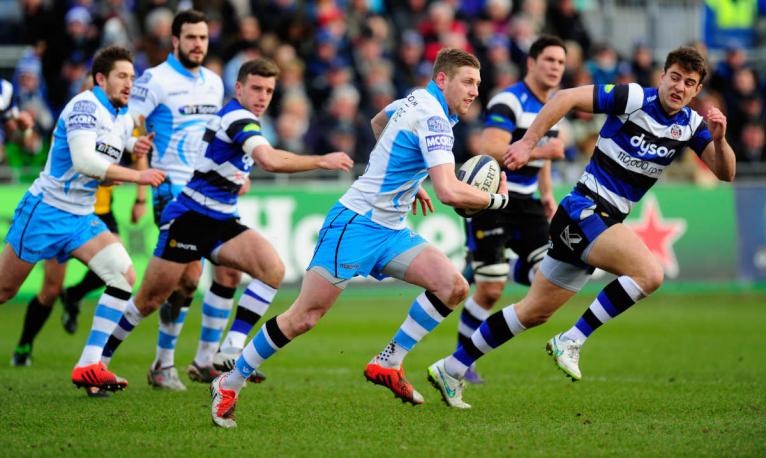
“Is he going to get the most out of the Bath team at The Rec when the River Avon is up and the pitch is heavy? Will he be able to offer the expansive game he is offering in Paris? I’m not sure he’ll be able to replicate it.”
But Bath’s Ben Spencer, one of the club’s senior players, is upbeat. “Everyone knows what Finn’s about and hopefully he brings all his experience and knowledge to the club,” says the scrum-half, who is likely to spend much of the forthcoming season in tandem with Russell. “The boys are really looking forward to getting out on the training pitch with him.”
The signing of Russell is a key plank in making Bath contenders again, both domestically and in Europe. But as the see-sawing nature of his relationship with Townsend has shown at Scotland, having the right coaching set up around Russell is vital if his talents are to be maximised.
Every club is looking for a competitive advantage. Human capital – people – is incredibly important
Johann van Graan
It is telling, therefore, that van Graan has also recruited a widening brains trust of proven coaches for the new season, including former Scotland coach Andy Robinson and ex-Scotland international Stevie Scott. While he is moving to the English West Country, Russell will have plenty of faces around him who will be able to empathise with life and play north of the Border.
Van Graan, who is beginning his second season in charge at the club, won’t let Bath stand still and his new pivot is a central part of that forward movement. “Rugby is ever-evolving,” he says. “You’ve got to make sure you keep up with the rugby world.
“Every club is looking for a competitive advantage. Human capital – people – is incredibly important.”
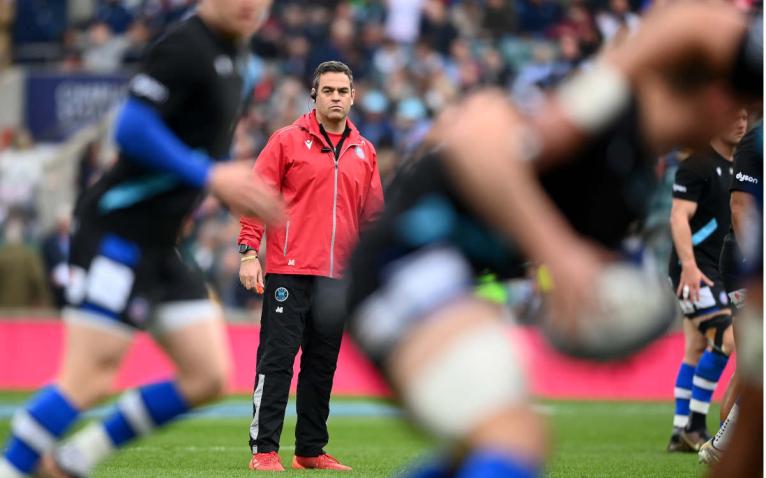
The conditions for Bath’s re-emergence have been carefully selected by Van Graan, and they go hand-in-hand with him developing the conditions that will allow Russell’s budding genius to fully flower.
Should the Russell experiment work, then the Scot could yet have the kind of moment that Barry John enjoyed many years after that wonder try against New Zealand Universities. Reflecting on just how he had managed to produce the try, he explained he had intuitively sensed defenders were off-kilter and that he simply had to follow his attacking instincts and continue with the ball in hand.
“I know it’s funny, but it was all as if I was in a dream, that I had ‘placed’ the defenders exactly where I wanted them, like poles in the garden to practice swerving,” John told Keating. “I don’t know what you call it? ‘Transcendental’? ‘Metaphysical’? I don’t really know the exact definition of those words, but it was just marvellously weird, like I was down there re-enacting the slow-motion replay before the actuality itself had happened. As if I was in a dreamy state of déjà vu, that I was in a game, and doing something that had already taken place at another time.”
We’ve all marvelled at the slow-motion replays of some audacious assist by Russell. And if he gets things right at the World Cup and at Bath, he may yet revive the spirit of John: a player whose genius shone in another place and at another time, and whose brilliance finds a half-formed echo in the Scot, even half a century later.


I'm pretty certain "budding genius" can't be applied to a 30-year-old.
You're still assuming the EP is a good league despite all the evidence showing it isn't. The challenge for Finn is playing alongside 9s and centres who don't know what they're doing. At Glasgow, Scotland and Racing they always did.
Excited for Bath next season. Definitely a team on the up!
Russell is a "budding" genius? Have you watched his games? Obviously not. There is a guy trying to research ethics in journalism, you should have a word with him